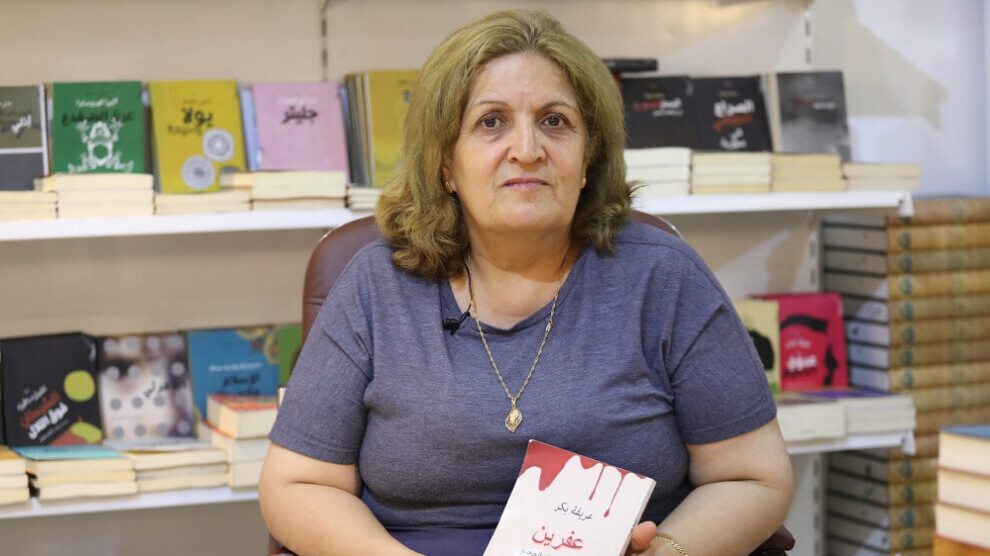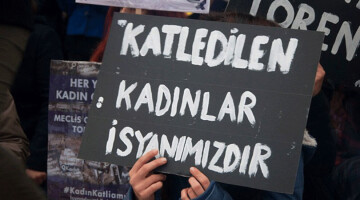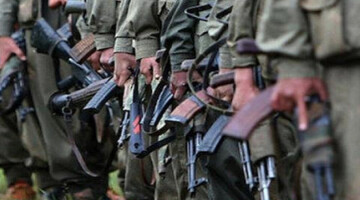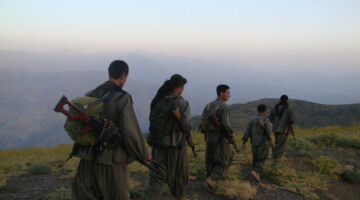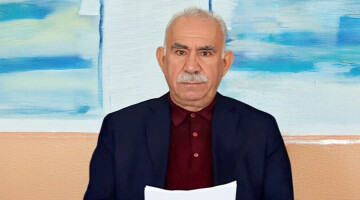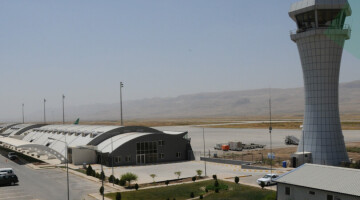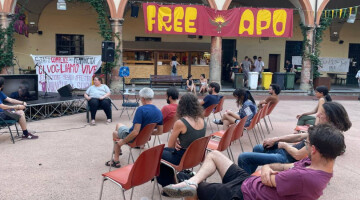At the moment, the Martyr Herekol Book Fair is taking place in the northern Syrian city of Qamishlo where hundreds of new books from Rojava and Northern Syria are presented. One of the authors is Arife Bekir. The Kurdish wife and mother has a long and difficult life story behind her. She was imprisoned and severely tortured under the Baath regime. She also experienced the liberation and self-administration of the predominantly Kurdish region, but equally had to experience the Turkish invasion in 2018 and leave her home region. In her 2020 book "Afrin: From Heaven to Hell," the author retraces this story, which is also the story of Afrin. In an interview with ANF, she talks about the content and intention of her work.
Could you tell us about the content of your work?
First of all, I would like to take this interview as an opportunity to congratulate the organizers of the 5th Martyr Herekol Book Fair and wish the authors every success. I am very happy that the book I wrote is presented here. My book "Afrin: From Heaven to Hell" has 116 pages.
The book starts with the history and geography of Afrin. Then it talks about the oppression of the Kurds under the rule of the Ba'ath regime, i.e. practices such as the banning of the mother tongue, etc. There is also a section about politicians and writers who were arrested by the regime. I also talk about the horror and torture I suffered during my time in prison under the regime.
With the proclamation of self-government, a new era began for Afrin. This part of the book describes the effects of self-government on Afrin - how Afrin became a paradise. The Turkish state was bothered by this and attacked our city in 2018. I also report on the 58-day resistance against the invasion and describe in particular the Turkish state's violations of war and international law in Afrin, the experiences of the people and the resistance of the fighters of YPG and YPJ, especially heros like Şehîd Karker and Şehîd Avesta. Apart from that, there are many stories and memories. There are some very painful memories, and I have also written about when these events happened. I personally interviewed those affected, wrote reports and included them in the book as well.
What was your goal in writing such a book? When did you start writing and how did you feel about it?
I have faced many difficulties since the invasion of Afrin to write this book. It was very difficult to express the suffering of Afrin. My friends constantly encouraged me. We must share the suffering of Afrin with the world. The whole world should know what happened in Afrin. Everyone should know about the violations committed by the Turkish state in Afrin. It had taken two years for my decision to write a book to mature, and I started in 2020.
I cannot even begin to describe the pain I felt while writing it. Each page carries a different pain, different stories. I lived there and felt all of that. We witnessed that very pain of the people in Afrin. I wanted to write about the suffering of the people and make it known to others. The Kurdish people have suffered vile attacks and human rights violations by the Turkish state for so long. However, most of these have not been written down, documented, and thus have not entered written history. Women, in particular, do not write much. As a woman, I decided to speak and write about the suffering of my people. Let the people of the world know what the Kurdish people have gone through in their history. There have been so many massacres. Recently, the peoples of Afrin, Shengal, Girê Spî, Serêkaniyê have suffered so much. As a woman from Afrin, I wanted to describe what happened in our city.
Every woman and every writer should write about it, even if it is only one sentence. Let's show people the suffering of our people. A people of millions, still seems to have no claim to rights. It is attacked day after day.
Why did you write your book in Arabic, and will you translate it into other languages?
I wrote my book in Arabic. I couldn't write in Kurdish. Because the regime never allowed us to learn our mother tongue. We were always prevented from doing so. My schooling was in Arabic, so I wrote in Arabic. I will translate my book into both Kurdish and English. My goal is to convey the suffering of my people and the attacks of the Turkish state on Afrin to the world population.
RELATED NEWS:

